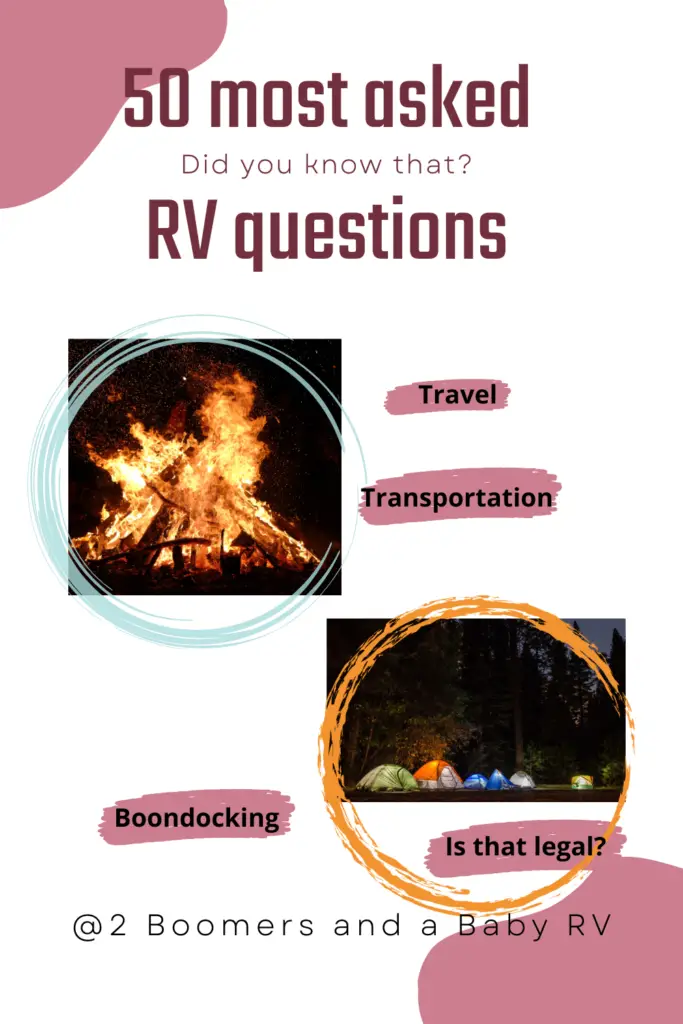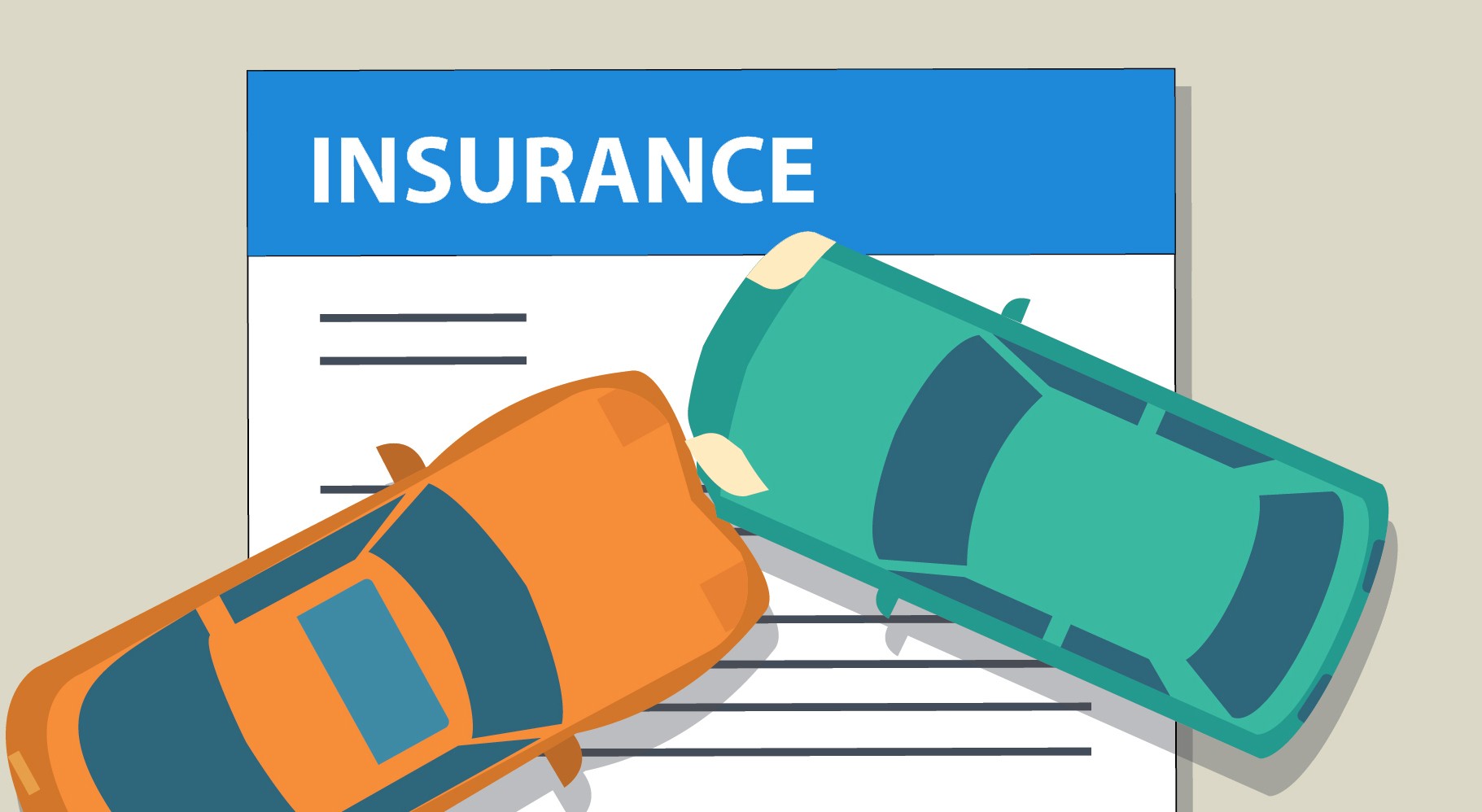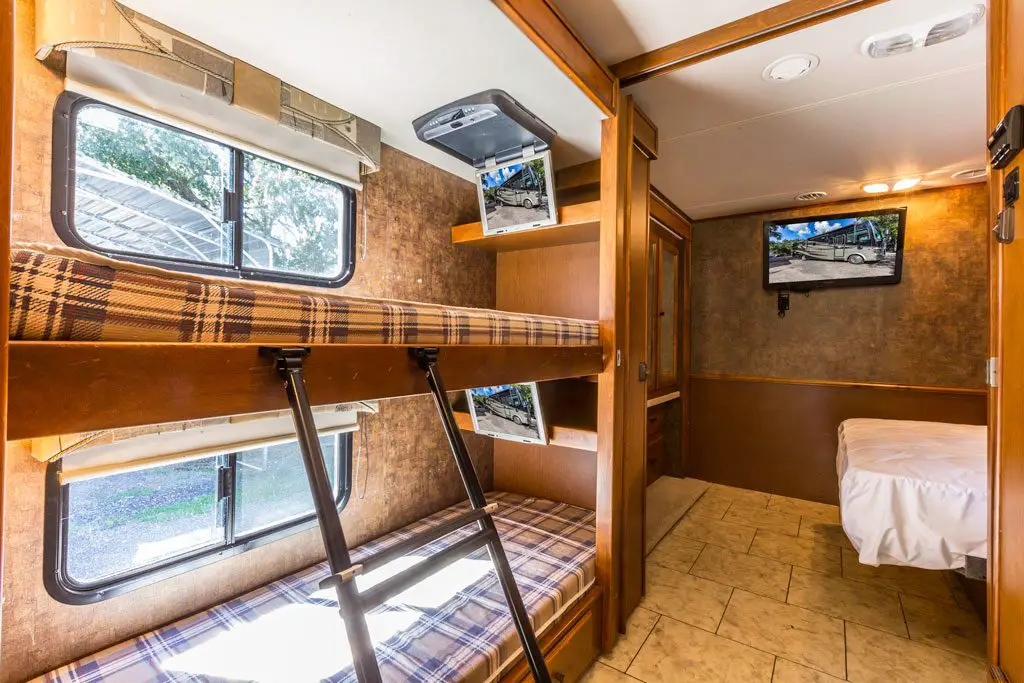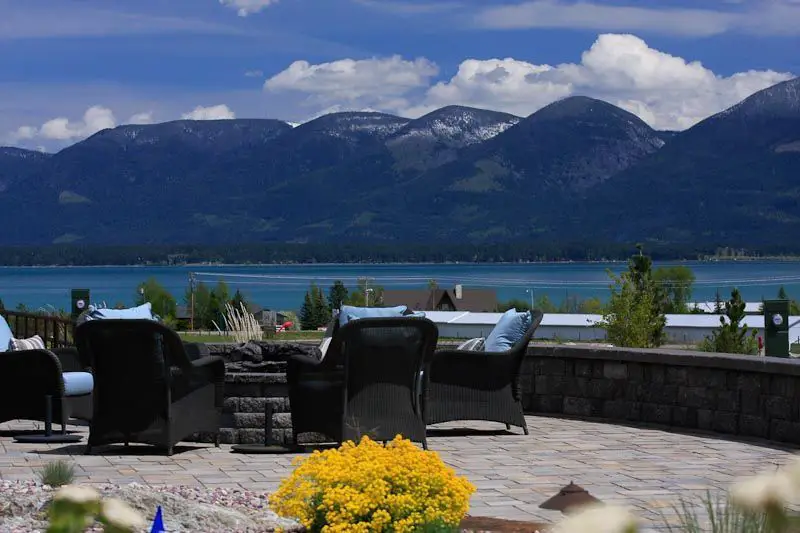If you are new to the RV world, it can quickly become overwhelming to look for answers to your questions. We decided to put together answers for the most Common RV Questions that will hopefully put your mind at ease.
We scoured the internet for 50 of the most asked RV questions and answers. If you don’t see your question or want more information on a provided answer, please leave a comment below and we will try to find what you are looking for.

1. Do you need seatbelts in the house of an RV?
Yes, each person in an RV should have access to seatbelt restraints for safety alone. Legally, requirements differ from state to state – For example: When traveling in Missouri, backseat riders under 15 must buckle up. The driver and front-seat passenger are required to buckle up. Montana – requires everyone in the RV to wear a seat belt. Nebraska – people in the front seat must wear a seat belt.
2. Can you carry a gun with you while traveling in an RV?
Yes, the good news is transporting firearms across state lines in your RV is the same as any other automobile. The gun should be unloaded and stored in the back of the RV in a locked compartment. It should never be in the glove compartment or center console. Any ammunition should be stored separately.
Remember to educate yourself about the states you will be traveling to if you plan to make stops during your travels. This is a highly debated topic whenever we post one of our common RV questions and answers. Knowing the laws in your area is my best advice.
3. Can you sleep in the back of an RV while driving?
No, everyone must always be secured with a legal seatbelt while on the road. Anything otherwise is both illegal and dangerous to all. It sounds like a great way to travel, but remember those walls surrounding you are very thin and would provide little protection in the case of an accident. Also being unrestrained flying around this tin can would not be much fun.
4. Is there a limit on how big an RV can be in National Parks?
Most parks can accommodate up to 25 feet in their parks, several have spots for larger RVs but it will be limited. Check ahead of time with park service before you head out on your trip.
This is where a TOAD vehicle is useful, as you can stay outside the park on a campsite and drive in for daily visits. This comes up a lot in RV questions and answers, but most people don’t realize that a lot of national parks have spaces for larger RVs, if you can get them reserved.
5. Can you poop in an RV?
Yes, you can most definitely poop in an RV. Some RVs have beautiful bathrooms that can even rival some sticks and bricks bathrooms I have seen. Toilet, double sinks, and tile wall showers. As you can imagine though when you have extravagant upgrades the price goes up right along with it.
Pop-ups can even have a bathroom but usually a wet bath setup (a wet bath is an all-in-one setup, where the toilet and sink are in the shower with you).
6. Do RVs have showers?
Yes, you can shower in an RV and most comfortably in larger units. To read how long can I shower in an RV? read here
7. Can you ride in a travel trailer or fifth wheel when towed?
Surprisingly, some states allow you to ride in the back while being towed down the road. You would need to check the laws of the state you are traveling in to be sure. I think it is unsafe and reckless as there is not much to protect you in an accident.
8. Does the battery charge when driving?
Most drivable RVs are set up for the house batteries to charge off the vehicle alternator. There may also be a bypass switch that needs to be flipped for this process. Best to check with your owner’s manual to be sure. Another popular question when we search for RV questions and answers on forums.
Read more about how RV batteries work and when they charge
9. Can I run the refrigerator when driving?
Yes, depending on the type of refrigerator your RV has, you may have to run your generator.
There are several common types
- Residential refrigerator – operates on 120V only
- A 2-way unit that runs on 12V or LP gas (often called a Dometic)
- A 3-way unit that runs on 120, LP or 12V
- 12V unit – newer product on the market
RV refrigerators: what are the best options to keep food cold
10. Does gas or diesel get better gas mileage?
If we are strictly talking about fuel efficiency, diesel motorhomes use much less fuel than their gas counterparts. The reasoning behind this starts with diesel fuel having a greater energy value than gasoline does. Its higher energy density means that diesel fuel can offer up to 10 percent better fuel economy by volume. RV questions and answers are unanimous when it comes to either diesel or gas. It really depends on what type of RV traveling you will be doing. Please read more below.
Gas or Diesel engine: which one is best
11. what does it mean to winterize my camper?
When RV season is over and it becomes too cold for you to travel anymore, you will want to winterize your camper before putting it away. This means getting your RV ready for the freezing temperatures that come along with winter in most places. The process of removing any water in lines or tanks that may freeze and expand.
12. Should I disconnect my batteries when RV is put in storage?
It is recommended that you disconnect the batteries and store them in a cool — but not cold — and dry place. batteries will lose some of their charges in storage; the cool temperature slows that loss. Check the charge every four to six weeks with a voltmeter or multimeter, and charge the batteries as necessary to keep them fully charged.
This is important because a partially charged battery may freeze faster than a fully charged one. It is best to bring them into the garage for storage as freezing can damage or destroy the batteries.
13. What is the best way to get mail when traveling in an RV?
The most common ways are, asking a family member or friend and mail forwarding service. My favorite is to ask a family member that I can trust and then they can forward this to me in bulk when needed.
If a family member is not possible we have a few more options below that may help.
- Mail forwarding service
- P.O Box
- Resort mail service
- UPS store
Learn more about receiving your mail if you are enjoying the full-time lifestyle
14. Is it even legal to live in an RV full-time?
Yes, it is legal to live in an RV. Each state, county, and local municipality will have its own laws/rules to abide by. It is best to research beforehand to assure you are not violating any local zoning laws or ordinances when you decide to plant roots. If you are wanting to park your RV permanently in a park or on your own property, this may involve having access to water, sewer, and so on to keep it legal. Full-time life is a hot topic and many people look to RV questions and answers for a little clarity about certain ways to go about it. This has become quite a popular lifestyle as of late.
15. Can I drive with my propane on?
This can be a very heated debate on both sides of the fence. Yes, it is very common for RV owners to drive with their propane turned on. Really the dangers of a propane tank are no different in a wreck whether turned on or not. If you are unsure of your tank’s safety while driving, then how can you be confident when you get to your next stop and open it up.
16. How much does it cost to live full-time in an RV?
This really depends on you and your lifestyle. I have heard of people spending as little as $500 a month to upwards of $5000 a month. There are so many variables involved in finding a good answer such as, how much will you travel, whether will you see all the attractions, and will you stay at resorts or do some boondocking.
For a more detailed article about full-time RV life, read here
17. what is an inverter?
An inverter takes 12-volt DC power from your RV batteries and electronically changes it to 120-volt AC. This source is often used to power your TV, microwave, hair dryer, or other appliances as needed. Using this source will only last as long as the house batteries have a charge.
18. What is a converter?
Converter basically does the opposite, taking the shore power 120V and converting it to 12V to charge house batteries and power 12V devices as needed.
19. How do I keep critters from invading my space?
One of the most popular methods is Peppermint oil or peppermint leaves. You can also try things such as Irish Spring soap or dryer sheets before resorting to an industrial, chemically heavy deterrent.
More tips and tricks to keep critters out of your RV
Tips and tricks to keep bugs out of your RV
20. What are house batteries?
House batteries are a battery or group of batteries that power 12V devices in your RV. Things such as lights, fans, or the water pump can operate from this source. 12V power can also be converted as we talked about earlier to power larger devices such as TVs and appliances.
These batteries are recharged by the alternator while driving. Also by the shore power or your generator with the use of the converter.
21. Do I need a special license to drive an RV?
Usually not, for RVs in most states, a standard driver’s license is all you need to drive your RV. If your RV, towing vehicle, or motorhome clock in above the maximum length or above 26,000 pounds, you may need a special license to register, own, and operate it in certain states.
22. What are Grey and Black Tanks?
The black tank is a holding tank attached to the underbelly of the RV. All of the waste from the RV toilet empties into the black tank. Black tanks vary in size anywhere from 15 gallons to 50 gallons.
The gray tank holds wastewater from every source other than the toilet, which includes your kitchen sink and bathroom sink. Soapy water, toothpaste, dust, and dirt from your afternoon hike or anything else you rinse down the sink drain and end up in the gray tank.
Tips to help maintain your black tank
Best way to keep holding tank odors under control
23. Do I need separate insurance for my RV?
Yes, if it is a motorhome and your auto insurance will not cover your RV. You must have at least the state minimum for liability coverage because they are driven and not towed. Much like your car insurance but usually less costly depending on your RV and the coverages added. This is a great question for this RV questions and answers blog since we have recently teamed up with Charlotte insure for all our RV friends to get the best rate and policy. Please visit them @ RvInsuranceShop.com for all your needs – let them know 2 Boomers and a Baby RV sent you.
Great live customer service – not a call center
24. What are GVW, GVWR, and GCWR?
- GVW – gross vehicle weight: curb weight or dry weight without any added supplies, people, or fuel.
- GVWR – gross vehicle weight rating: Simply put, GVWR is the maximum total weight of your vehicle. Tells you how much your vehicle can safely weigh.
- GCWR – gross combined weight rating: This is the maximum allowable weight of both the loaded tow vehicle and the loaded trailer that the tow vehicle can handle safely.
- Payload capacity: This is how much weight can be carried in the vehicle, people, fuel, camping equipment, and weight from the tongue of the added trailer
- Tongue weight: The weight from a trailer or fifth wheel transferred to the rear of the tow vehicle. The trailer would add pressure/weight to a hitch and fifth wheel over the rear axle in a truck bed.
25. Where do you do laundry?
Keeping up with the laundry while traveling in your RV can be a challenge at times, but there are multiple ways in which you can complete this task.
- Laundromat – bring quarters and supplies
- Onboard washer and dryer if space and cost allow
- Portable washer and dryer – Smaller more affordable units that can be set up and stored as needed.
- Campground laundry facilities
26. What is meant by the 10-year rule?
The ten-year rule at RV parks. “The Ten Year Rule” is a code that’s enforced at many upscale RV parks around the country. The rule implies that RVs older than 10 years are too weathered and worn and should be prohibited. The rule is often enforced regardless of how pristine the RV actually is.
Tips and tricks to get around the 10-year rule
27. What is Boondocking?
In short, boondocking is off-the-grid RV travel. Sometimes referred to as “dry camping,” boondocking is any time you camp in your RV without water, sewer, or electrical connections. RV questions and answers are filled with topics about the boondocking lifestyle. There is just something about getting to be one with nature.
If this is a lifestyle that interests you, learn more about boondocking tips and tricks
28. What is a TOAD vehicle?
A toad is a vehicle you tow behind your motorhome. It’s there so you can set up camp and still have an easy way of traveling around without having to drive your RV everywhere.
What is the best vehicle to tow behind my RV?
29. Can I drink alcohol as a passenger in an RV?
Currently, 40 states and Washington D.C. forbid the possession and consumption of open alcoholic beverages in motor vehicles. This includes the driver and the passenger in a motorhome.
30. How long do RV tires last?
The rule of thumb for changing your RV tires is anywhere between four and six years. If you are on the road often, and you think your tires need to be changed, therefore it may not be possible to last as long as six years. RV tires are known to last longer with lower miles and proper care, but for me, peace of mind just slips away.
31. What’s a stabilizer jack?
On Larger RVs, a stabilizer jack is a metal arm that is installed into your RV’s frame and designed to extend from the frame of the RV onto the ground. When you’re on the road, your jacks should be retracted into the frame. When you’ve parked, you’ll fully extend them until they touch the ground. These systems are designed to lift the weight of the RV and can be used to level or stabilize.
32. What are leveling blocks?
An RV leveling block is like a mini ramp for your tires to rest on. Most are made of plastic, and many are designed to stack up and connect with each other to form a graduated series of flat surfaces for parking a tire.
33. How much does an RV weigh?
The short answer is, The average RV weighs around 10,000 pounds (dry weight) give or take. Dry weight is the weight of the RV when tanks are not filled and it has no gear in it. Therefore, When you start loading supplies, water, and yourself it will add around another 1,200- 1,500 pounds.
34. What are the most common problems with an RV?
- Tire blowout
- Electrical issues
- Battery drain
- Leaks in roof or windows
- Slide malfunction
- Burst water lines
- Toilet/black tank clog
It would not be an RV questions and answers blog without people wondering what the common problems that you might run into are.
More common RV problems that you don’t want to see
35. What types of RVs are there?
Drivable
Largest – Class A
Midsize to large Class C
Small to midsize Class B
Towable
Travel Trailer
Fifthwheel
Tear Drop
Pop Up
These are the most common, but people also convert vans, ambulances, and buses to make great camp spaces.
36. How long do RVs last?
In general, you can expect your RV to last around 15-20 years. This number can go up or down depending on how well it is maintained over its life.
A drivable RV has a lot more moving parts that need to be serviced regularly than a towable unit.
37. Does my RV Insurance cover my Awning?
Awning damage to your RV is often covered by an RV insurance policy, though the details vary depending on your policy and insurer. Some providers may include it as standard on collision or comprehensive coverages. In other cases, awning damage can be included but is subject to a different deductible than other claims.
Learn more about RV insurance and what is actually covered
38. Can I run 2 AC units on 30amp service?
Yes, you can run 2 units if your system is set up correctly. The biggest draw will come when the units are starting up. It is best to have them cycle and not try to kick them both on at the same time. There is also an easy start add-on that can assist with starting up your AC using less of a power draw.
39. Should I level my RV before letting the slides out?
Before putting your slides out you need to assure that your RV is level and stable. Not leveling your RV first can place unwanted binding on your slides that could either bend the tracks or burn up your slide motors prematurely.
When you read RV questions and answers in articles about slides, you may see other answers. Trust the manufacturer’s answer first before the weekend warrior that is just throwing out his opinion on it.
Learn more about caring for your RV slide seals
40. Are the holding tank gauges accurate?
Holding tank gauges are known for not providing accurate readings when used. Either due to poor design from the start or from just waste buildup blocking them over time. Mine actually work great and are almost 30 years old, but that is definitely not the norm.
It is best to be aware of your tank usage and eventually, you will be able to make an educated guess on time till the next dump.
41. What can I do to make my RV ride better?
The biggest improvement will come in the form of upgraded suspension, new shocks, a sway bar, and steering stabilizers. You also want to assure you have the correct tire pressure and that the front end is in alignment. So, all these work together to provide a smooth balanced ride, if one is bad it can throw everything else off.
Tips and tricks to make your RV ride and handle better
42. Can I use external propane tanks for my RV?
Yes, with the proper connections and care you can add an external propane tank to either use in the RV or to power a portable stove.
RV propane tanks: Everything you need to know
43. How can I get around the campground without a TOAD vehicle?
Walking or jogging is a great option to get around and requires no extra equipment to use it. Unfortunately, many are unable to use this source of travel, but options are available. From golf carts to Ebikes, learn more ways below that can make campground travel a breeze.
Creative ways to get around the campground in style
44. Should I leave holding tanks open when hooked to full hookups?
Leaving a black tank valve open is an absolute no-no. It will cause all the liquid to flow out, leaving the solids no way of draining. Always make sure the valve on your black tank is closed completely after dumping. When you’ve ensured the valve is shut, pull the grey tank valve. The gray tank can be left open, but you will want to retain some of its fluid before preparing to dump tanks. This will give you fluids to help clean your lines once the black tank is dumped.
45. Can I leave the water pump on all the time?
Yes, with a properly functioning water pump, you can leave it on all the time. With that being said, I do not suggest this as a malfunctioning pump will burn up quickly if no water is available to be pumped.
I personally only turn the pump on when I plan to use it and then turn it back off after use.
46. What are the best ways to keep an RV cool in the summer?
Trap cool morning air inside your RV by closing all of the windows and vents when you wake up in the morning. Also, try to minimize opening and closing your RV’s door to keep the inside as cool as possible
Tips and tricks to keep your RV cool all summer long
47. How big is an RV refrigerator?
Standard RV refrigerators will be between 4 and 12 cubic feet depending on which type you choose. Residential refrigerators are just the same size as what you would see in your home and measure between 18 to 21 cubic feet.
48. How can I improve my RV gas mileage?
You can improve your RV gas mileage by choosing a smaller rig, keeping up with your RV maintenance schedule, modifying the way you drive, and planning wise travel routes ahead of time.
It is also important to remember that the gross vehicle weight of your RV, supplies and towable toys has the potential to greatly impact your RV gas or fuel mileage.
49. What is the best way to eliminate black tank odors?
For the best results try Happy Campers with 5-star reviews and thousands of well, happy campers. Happy campers are the most effective and cost-efficient treatment we have found to date. We will talk a little about what causes the smell, holding tank treatments, and the best ways to minimize odors before they begin. At around $.62 cost to treat 40 gallons, it’s very friendly on the wallet.
Happy Camper works the best and the per-use, price is hard to argue against.
50. What should I be looking for when shopping for an RV?
First impressions are everything and shopping for an RV is no exception. Trust your gut and your nose! This is a big investment and there are plenty of RVs to choose from, well most of the time. Lately, we have seen a shortage, but I think it will correct itself before we know it. A thorough checklist for RV inspections is a must to keep from having buyer remorse.
Complete 101 point inspection checklist for RV shoppers





6 thoughts on “50 answers to the most frequently asked questions about RV life”